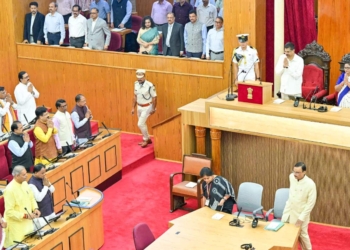In a significant move to lighten the compliance burden on small traders, incentivise entrepreneurs, and foster a more business-friendly environment, the Odisha government has approved the Odisha Shops and Commercial Establishments (Amendment) Ordinance, 2025.
Passed during the 27th Cabinet meeting on September 29, 2025, this ordinance introduces pivotal changes to the Odisha Shops and Commercial Establishments Act, 1956. It aims to spur economic activities and create more employment opportunities across the state.
Chief Secretary Manoj Ahuja, while briefing on the decision, emphasised that the ordinance seeks to make the business ecosystem in Odisha more accessible and flexible. Issued under Article 213 of the Indian Constitution due to the ongoing recess of the State Assembly, it will later be replaced by a full-fledged Act during the next legislative session. Notably, the ordinance applies specifically to establishments employing 20 or more workers. Thus, it eases regulatory pressures on smaller outfits.
Under the new provisions, all establishments—regardless of employee count—must display signboards in Odia. Daily working hours for factories and commercial units can now be extended up to a maximum of 10 hours (previously 9 hours), subject to written consent from employees. This extension entitles workers to a compensatory off-day in the same week with full wages. The weekly working hour cap remains unchanged at 48 hours.
Further relaxations include increasing the limit for continuous work without a break from 5 to 6 hours. A mandatory half-hour interval follows. Spread-over hours, including rest intervals, can go up to 12 hours daily for factories (up from the previous limit). Overtime remains compensated at double the regular wage rate for any work exceeding fixed daily or weekly hours.
To safeguard worker welfare, the ordinance caps total daily working hours at 12 (excluding breaks) and 13 hours including breaks. Weekly totals (including overtime) must not exceed 60 hours. A major highlight is the hike in quarterly overtime limits from 50 hours to 144 hours. This provides greater operational flexibility for businesses during peak periods.
In a progressive step towards gender equality, the ordinance removes restrictions on women’s employment in any type of work across all establishments. Women can now be hired before 6 AM or after 7 PM, provided they give written consent. The state government also notifies additional safety conditions.
Chief Secretary Ahuja reiterated that these amendments are designed to reduce compliance burdens on small businesses, encourage industrial growth, and promote greater workforce participation for women. “By streamlining regulations, we’re not just easing operations but also paving the way for more jobs and economic vibrancy in Odisha,” he stated.
In a related development during the Cabinet meeting, approval was also granted for cadre rules under the State Insurance Scheme for laboratory technical services. This will streamline recruitment and promotions for such employees.
This ordinance is expected to have far-reaching implications for Odisha’s retail, commercial, and small-scale industrial sectors. It aligns the state with national efforts to simplify labour laws and boost ease of doing business.






























